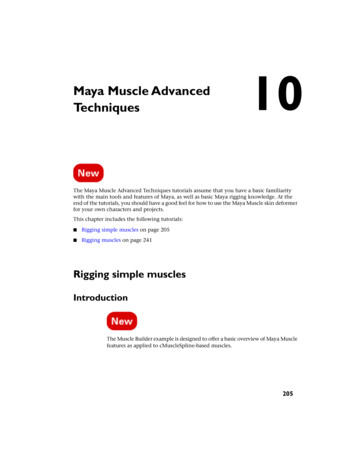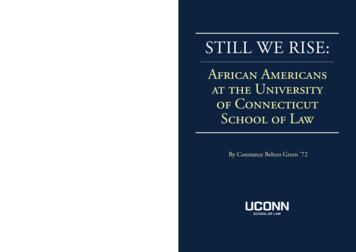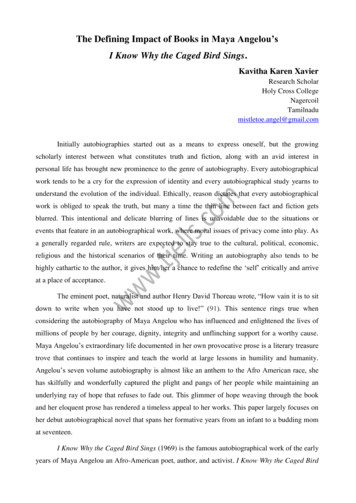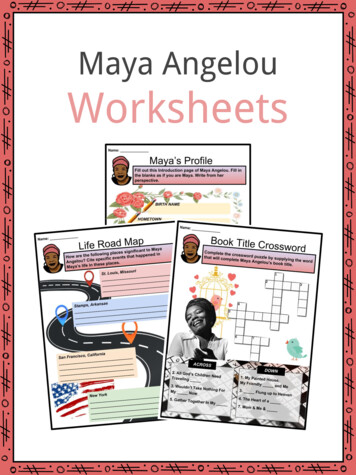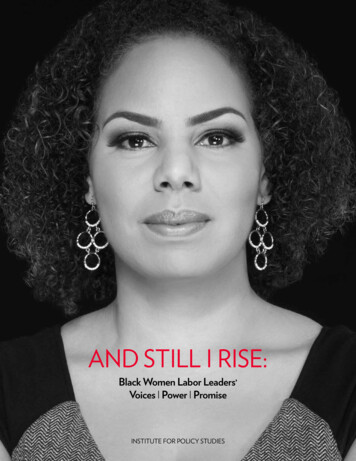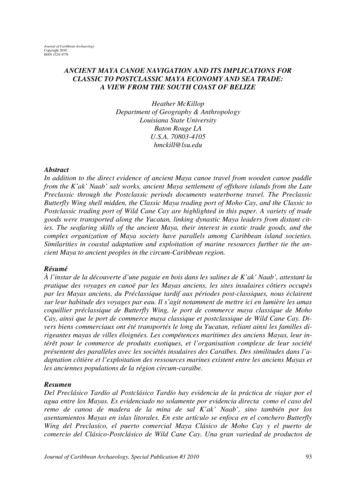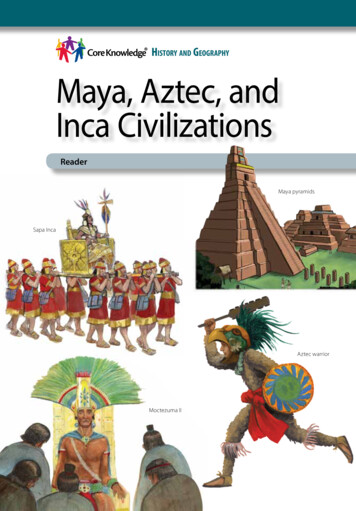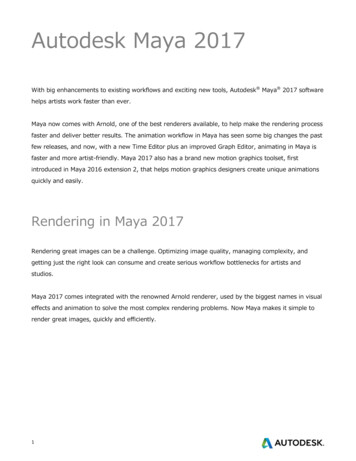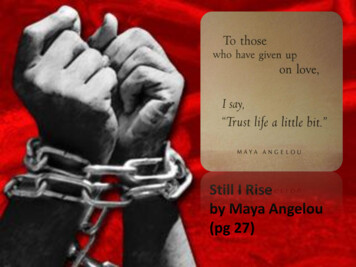
Transcription
Still I Riseby Maya Angelou(pg27)Still I Rise by Maya Angelou (pg 27)
Getting to know the Poet Maya Angelou is an African-American woman who wasborn in 1928 in a poor neighbourhood in St. Louis. Her childhood was extremely tough and in her first book IKnow Why The Caged Bird Sings she describes her rape,aged 8, by her stepfather. When she told her brother about the attack, her stepfatherwas arrested but released just four days later. In turn, fearing her speaking out caused the death, Mayabecame mute and did not speak for nearly five years. Angelou has campaigned for equal rights for blacks inAmerica for many years.
The right for all women tovote in the USA was 1920.NZ – 1893, EGYPT 1956,SAUDI ARABIA 2011.White women in SA – 1930Black women across theWorld – after 1965.
Still I Rise - Title Literally, the words mean picking oneself up from theground or to move from a lower position to a higherone. Figuratively, the words could mean lifting your spirits,aspirations, goals or dreams. The expression ‘rise to the occasion’ may also cometo mind i.e. behaving in an exceptional way undercertain circumstances.
By addressing the reader directlyfrom the start, Angelou forces usto consider ourselves as racist oroppressive. APOSTROPHEYou may write me down in historyWith your bitter, twisted lies,You may tread me in the very dirtBut still, like dust, I'll rise. SIMILEin tone: she ispowerful and resilient; christlike imagery in this simileharsh, aggressiveadjectivesrepresenting theruling white classeswho misrepresentedthe blacks – plays onthe idea that history isnot necessarily factual– someone had towrite it in the firstplace and they couldbe biased or racist.drive-word – changerhyme scheme: abcb
‘sassiness’– confidence, charismarhetorical questionsdirected at the readerDoes my sassiness upset you?Why are you beset with gloom?'Cause I walk like I've got oil wellsPumping in my living room.RHETORICAL QUESTIONS: Areyou blinded by black success?Simile and metaphorOil wells pumping in her livingRoom. HUMOROUS – it symbolizesher success.simile - powerful, confidentimagery
similes – inevitability that she will survive prejudiceJust like moons and like suns,With the certainty of tides,Just like hopes springing high,Still I'll rise.continued repetition of title –reads like a song’s chorus.It is in her nature to rise up andstand against oppression just asit is the nature of tides to respondto the moon.Emotionally strong likethe moon & sun will riseno matter what.triumphant tone
Did you want to see me broken?Bowed head and lowered eyes?Shoulders falling down like teardrops.Weakened by my soulful cries.Society expects her to bow her head downand lower her eyes, with shoulders droopingin despair. They expect her to speak in aweakened voice.Images of painand suffering.The opposite ofthe forcefulsimiles earlier inthe poem –important tonote thiscontrast: Whereshe was strongand powerfulbefore, she isnow weak andsubmissivethanks to theprejudice shehad faced.Cuttingquestions.
‘haughtiness’ – pride and confidence- she continuous in asarcastic tone as she pretends to comfort the listener.Does my haughtiness offend you?Don't you take it awful hard'Cause I laugh like I've got gold minesDiggin' in my own back yard.this stanza returnsus to the confidentnarrator of theearlier stanzas‘gold mines’ – just like ‘oil wells’ instanza two are symbols of wealth –something black Americans werenot able to have for themselves.They would be employed to work insuch places as oil fields and goldmines but not share in any of thewealth. She flaunts her successbefore the society that has alwaysoppressed her.
You may shoot me with your words,You may cut me with your eyes,You may kill me with your hatefulness,But still, like air, I'll rise.(Hyperbole)(Simile)Does my sexiness upset you?Does it come as a surpriseThat I dance like I've got diamondsAt the meeting of my thighs?‘diamonds’– again another symbol of wealththat needs mining. She is taking back what shefeels should rightfully be hers.list of three –usesrepetition on‘you’‘shoot’, ‘cut’,‘kill’ – violentverbs revealextent of hatredCelebrates hersexuality –designed to makethe white readerfeeluncomfortable.
Change of rhythm,Out of the huts of history's shametone, rhyme, lengthI riseof lines and length ofUp from a past that's rooted in painstanza. Reflects theI risetriumphant ending.I'm a black ocean, leaping and wide,Welling and swelling I bear in the tide.The metaphorsLeaving behind nights of terror and fearand references inthe final stanzaI riseare much clearerInto a daybreak that's wondrously clearpieces of evidenceI risethat this poem isBringing the gifts that my ancestors gave,about racialI am the dream and the hope of the slave. discriminationI riseI riseRepetition at end is victorious and triumphantI rise.
Angelou says she is a black ocean, holding in allthe shame and pain of her race and gender withinher tide. However, all is not black in her world.She is able to emerge out of the dark nights intothe brightness of day, carrying within her thelegacy of her ancestors, and their hope of findinga new life in America and not as the slaves theyarrived in the country.
Themes and Subject Survival
Themes and Subject Prejudice
Themes and Subject Confidence
Themes and Subject Racism
What message is the poemtrying to bring across?
THEME The poem’s literal meaning is a sarcasticresponse towards the people who look down onthe speaker.This poem delivers the message of the human’sincredible strength and ability to overcome hurt.
TONE: ‘YOU’ – is an accusatory tone- causing thereader to acknowledge that they may play a partin oppressing others/ women in their own lives.Humorous and playful and then strong andpowerful.Sometimes serious and full of pride.
Complete the below questions inyour Interactive English Textbookon page 99-100-Scratching the surface (questions 2-5)Understanding the language (questions 1-11)Understanding the toneUnderstanding the message (questions 1-2)One Step Further
Still I Rise by Maya Angelou (pg 27) Getting to know the Poet Maya Angelou is an African-American woman who was born in 1928 in a poor neighbourhood in St. Louis. Her childhood was extremely tough and in her first boo
